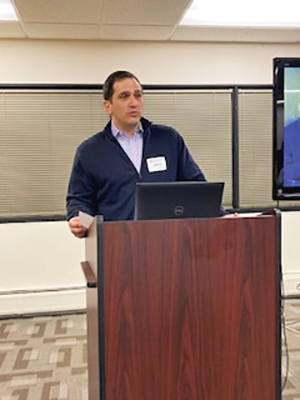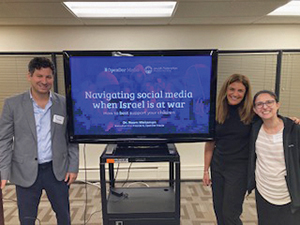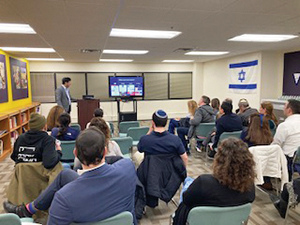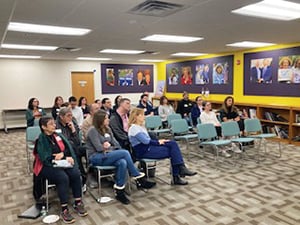
On Thursday, March 7, Dr. Noam Weissman, executive vice president of OpenDor Media, addressed a compact but highly engaged audience at the Jewish Federation of Northern New Jersey in Paramus. The hot topic: social media and Israel at war. In his introductory remarks, Weissman noted that there had already been a groundswell of interest in this topic even prior to the horrors and tragedy of Oct. 7.
Weissman attended Yeshiva University and went on to earn a doctorate in educational psychology from the University of Southern California.
In their own words, OpenDor Media’s vision is “To be ‘the’ address for the most engaging, informative and inspiring Jewish and Israel-related educational media. Since 2009 OpenDor has been a pioneer in the production of engaging, informative and inspiring Jewish and Israel-related educational media; bringing ideas, values and stories to life for a global audience of millions.”
OpenDor reported that their award-winning videos have been screened at hundreds of film festivals worldwide and in thousands of communities. Their digital “edutainment brand,” “Unpacked,” reaches its expansive global audience via its website, podcasts and across all social media platforms. Videos are supported by extensive educational resources and are featured on “Unpacked for Educators,” a digital resource that reaches thousands of educators worldwide.

Weissman was introduced by his longtime friend from YU, Joey Small. Weissman explained, “Unlike other media outlets, we have a core educational mission that underpins all of our content. We are not simply reporting the news or informing our audience, but are also committed to education about Judaism and Israel and delivering that in an engaging way that resonates with Gen Z. We break down complex topics, provide history and context, and share multiple perspectives on each issue. We are differentiated by the mission our content serves: to strengthen the understanding and enduring personal connection of young Jews and their peers to Judaism, Israel and the Jewish people and to address the challenges young Jews face today.”
He called attention to the fact that it’s not the exclusive job of schools to carry the full burden of educating students about social media issues. He emphasized that parents, in the role of social media educators, need to be aware that the evidenced-based ideal approach to these (and in general many) issues of parenting style, is to be authoritative, rather than authoritarian.
“Meet your children where they are; not where you are. And the subject of your conversations is the child; not the topic.” He presented the paradigm of children (and adults) learning to be “scouts” via a “thought mapmaking” for good decisions, rather than “soldiers” who merely defend their position, traditionally following orders.

Asked about whether their target audience of Jewish students seems to be “preaching to the choir,” Weissman responded, “The reality of the landscape of young Jews today is that they are not all ‘part of the choir.’ Instead, surveys show deep generational divides on senses of connection to Israel and how important Israel is to Jewish identity. We believe that it’s critical that ‘the choir’ is gaining access to the educational content that they need in order to explore/preserve/grow their Jewish identity while at the same time, are driven to support a non-Jewish audience who yearn for balanced Jewish/Israel educational content.”
Weissman also brilliantly addressed the issue of whether the use of media can “turn the tide” of world opinion toward favoring Israel, and wake people up to the evil reality of the terrorist perpetrators. He related the well-known story told by Rabbi Yisroel Salanter, of a young man who wanted to change the world, but he found that it was difficult, so tried instead to change his nation, to the situation today. Realizing he couldn’t change his nation, he focused on his town and couldn’t change his town, so he tried to change his family. Finally as an old man he realized that the only thing he could change was himself and could therefore have an impact on his family. As a result, he and his family could have had an impact on his town, and that impact could possibly impact the nation and thereafter, possibly, the entire world.
“We’re constantly trying to change everyone else’s opinion about Israel and more broadly, about the Jewish people. I’d suggest that ‘turning the tide’ of public opinion starts by doing exactly what Rabbi Salanter was teaching us way back in the 11th century. That is to harness the incredible passion and energy we have as individuals and leading with nuanced educational content. Start by positively influencing the Jewish identity of those within our immediate respective environment. It’s only through education that we’re able to combat bias, antisemitism and hate in all forms, and ultimately what will lead to impact on the broadest possible scale.”
Weissman also commented on how social media can better serve the interests of Israel and Jews in the current climate of lies, deceit and antisemitism since this disinformation is one of the legendary strong suits of terrorist organizations.
“I’m not sure that the Palestinians are better at selling their ‘story’ but rather that they have an easier story to tell which they fit into neat, catchy slogans and pithy one-liners to pull the ‘undecided voter’ into their slipstream. What I mean by that is: we’re plagued by this false dichotomy (and at times buy into it ourselves as Jews) whereby you’re either the oppressor or you’re oppressed. Specific to this conflict, binary decisions are made as to where one places each of the sides to this conflict.

“In this skewed logic, for the most part the Palestinians are weaker, more vulnerable while Israel is considered to hold all the power. I wonder if perhaps it feels disconcerting for many to see Israel and by extension, Jews, with this extent of power [but we shouldn’t feel ashamed of that; we’re blessed to finally have a state] to feel a deep connection to the Jewish people and to have a unity unlike many others who have come before us.”
He continued, “Our approach to combating the lies, deceit and antisemitism on social media is to tackle the controversial topics head on through education; [via] balanced, fact-based content which goes beyond catchy chants and pithy one-liners and gets to the root of the opposing argument.”
The program was co-sponsored by Yeshivat Frisch, Mayanot and the Torah Academy of Bergen County (TABC).
Weissman was joined by colleagues Sarah Gordon, senior director of Israel education for “Unpacked for Educators;” and Beth Jenis, regional director, East Coast.
Ellie Wolf, MS, BCB, Senior Fellow/BCIA, is a long-time staff writer for The Jewish Link and provides biofeedback services in two local psychology practices. There she specializes in anxiety and panic disorder, pain and headaches, insomnia, hypertension and stress recovery.









